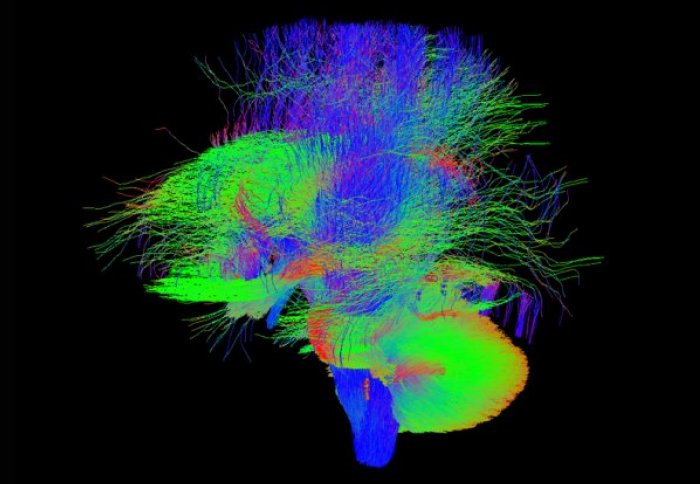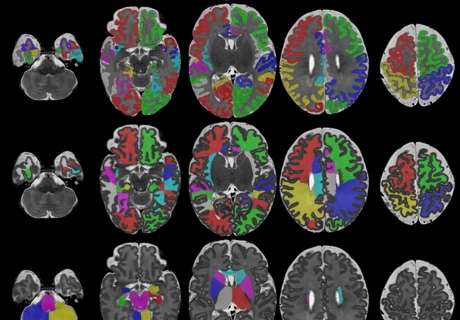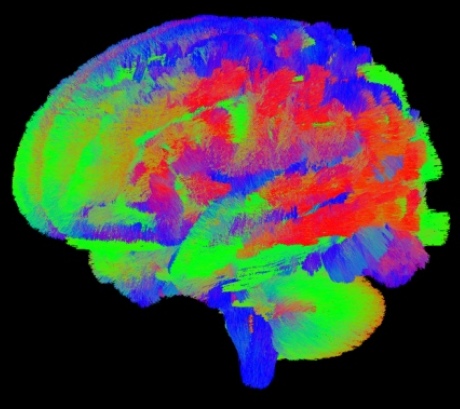Newborn baby brain scans will help scientists track brain development
by Ryan O'Hare

The collaborative project has shown how networks of neurons connect in the developing brain
Scientists have published ground-breaking scans of newborn babies' brains which researchers around the world can use to study how the brain develops.
The stunning images are part of the Developing Human Connectome Project (dHCP), a collaboration between King’s College London, Imperial College London and the University of Oxford, which will uncover how the brain develops, including the wiring and function of the brain during pregnancy and how this changes after birth.
As part of the project, the dHCP researchers are sharing the images and methods online so that other scientists from around the world can use the data in their own research.
Using Magnetic Resonance Imaging (MRI) scanners at Evelina London Children’s Hospital, the team has developed new techniques which enable images of the brains of foetuses and babies to be captured.
They have managed to overcome problems caused by babies’ movement and small size, as well as the difficulties in keeping vulnerable infants safe in the MRI scanner, so that they can now produce highly detailed and rich information on brain development.

MRI scans from newborn babies show the levels of the developing brain in detail
The project will help scientists to understand how conditions such as autism develop, or how problems in pregnancy affect brain growth.
In order to capture the images, Professor Jo Hajnal and colleagues at King’s developed new MRI technology specifically designed to provide high resolution scans of newborn and fetal brains.
A group led by Professor Daniel Rueckert, from Imperial's Department of Computing, developed new computer programs to analyse the images of the developing brains.
It will provide the first map of how the brain’s connections develop, and how this goes wrong in disease
– Professor David Edwards
Principal investigator, King's College London
“We have been developing novel approaches that help researchers by automatically analysing the rich and comprehensive MR images that are collected as part of dHCP,” he explained.
Lead Principal Investigator, Professor David Edwards from King’s College London and Consultant Neonatologist at Evelina London, explained: "The [project] is a major advance in understanding human brain development - it will provide the first map of how the brain’s connections develop, and how this goes wrong in disease."
The research collaboration is funded by a €15 million Synergy Grant from the European Research Council, and one of the goals of the project is to make sure that the data is shared as widely across the world as possible.

Image analysis enables scientists to see the connections between brain cells in the infant brains
The preliminary set, released today, will be followed by further data releases with scientists able to download the images
At the University of Oxford, Professor Steve Smith’s team has been developing specific techniques to define where the connections are in the developing brain.
It is hoped that the first data set will enable scientists to start exploring these powerful images and begin mapping out the complexities of human brain development in a whole new way.
The group hopes to study more newborn babies, as well as recruiting pregnant mothers for scanning the brains of babies developing in the womb.
-
Image credit: The Developing Human Connectome Project Consortium
This article is based on materials produced by King's College London.
Article supporters
Article text (excluding photos or graphics) © Imperial College London.
Photos and graphics subject to third party copyright used with permission or © Imperial College London.
Reporter
Ryan O'Hare
Communications Division